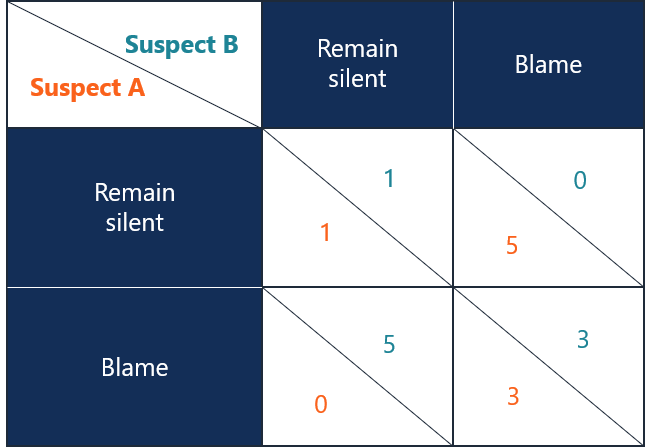Non-Cooperative vs. Cooperative Game Theory
In our class, we learned about game theory. Specifically, we learned about non-cooperative zero-sum games in which the players, often firms, directly compete against one another and losses from one player benefit the other player. In these games, there is typically a Nash Equilibrium point at which typically none of the players reaches their full potential, but also none of the players reaches their greatest loss. In the case of the prisoner's dilemma, both prisoners decide to speak with the payoff being that they both get more years each than if they had both remained silent, but neither of them gets the worst option from being silent while the other prisoner talked. In this sense, we generalized the non-cooperative zero-sum games of all having these properties in their equilibrium point.

Sources:
http://www.lsi.upc.edu/~ia/nash51.pdf
https://cdn.corporatefinanceinstitute.com/assets/prisoners-dilemma.png
https://www.asc.ohio-state.edu/peck.33/gametheory/gameL10.pdf

Nash Equilibrium point at bottom right
However, there is another type of game that can be examined in game theory. The cooperative game requires more than two players, but it comes with the assumption of cooperation. In cooperative games, the players can form coalitions together to get a net profit greater than what they could individually obtain. These coalitions are often formed through binding contracts to prevent one player from suddenly breaking out of an agreement. This means that based on how players decide to group together, the distribution of outcomes and their respective utility values can change. Cooperative games lead to significantly more options for how the game can be played out, and players can stand to profit by playing with others than competing.
It seems as though companies would always want to engage in cooperative games in the real world, as they would profit more than they do individually. However, cooperative games come with their own problems. Rather than the direct loss of utility in non-cooperative games, cooperative games create problems through legality. Companies engaging in cooperative conduct can often be bad for consumers, which leads to the companies getting into legal trouble for collusion. Also, companies who directly compete with one another often risk losing a loyal customer base by cooperation. Cooperative games, while effective on paper, are not significantly better than their non-cooperative counterparts in reality.
Sources:
http://www.lsi.upc.edu/~ia/nash51.pdf
https://cdn.corporatefinanceinstitute.com/assets/prisoners-dilemma.png
https://www.asc.ohio-state.edu/peck.33/gametheory/gameL10.pdf

Basically cooperative games are collusion? Or just most of the time? If so I think a follow up article on collusion and when it is illegal or how modern firms get away with it would be a super interesting blog post!
ReplyDeleteThere is a really interesting point you made there. As you stated, Cooperative game is a case of collusion in the non-cooperative game theory model, and many cases that it is illegal. Since these models exists in real life, how can they operate the cooperative game in a way without legal concerns. Ultimately, which model do you think is the most consumer friendly means of operation?
ReplyDelete